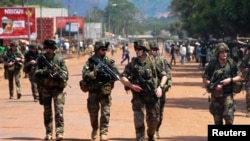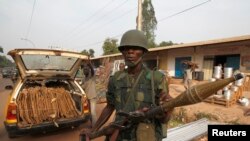Human rights groups say a wave of "ethnic cleansing" has taken hold in the Central African Republic, where Muslims are fleeing their homes and neighborhoods to escape attacks by Christian and allied militia groups.
Amnesty International and Human Rights Watch both issued calls on Tuesday for French and African peacekeepers in the C.A.R. to protect Muslims from further attack.
Human Rights Watch emergencies director Peter Bouckaert just returned from a three-week stay in the C.A.R. He told VOA English to Africa Service that the attacks against Muslims began back in September, and appear to be coordinated.
"In the northern regional capital of Bossangoa, one day on September 5, there were five different attacks on major trading towns located dozens of miles apart, which killed hundreds of Muslims and nomads - which are also Muslim - in a single day," he said. "So we’re talking about militarily coordinated attacks, a clear strategy to try to terrorize the Muslim community and to drive them out of the country, to never return."
Both groups say the violence was triggered by a wave of killing and looting in Christian villages by mostly Muslim Seleka rebels who toppled President Francois Bozize almost a year ago.
Amnesty says peacekeepers have been slow to protect Muslims as the Seleka retreat and reluctant to challenge the anti-Balaka militia that have taken over several towns.
The rights group says it has documented large-scale attacks on Muslim communities in five northwestern towns. It says more than 100 Muslims were killed in a single attack in the town of Bossemptele on January 18.
More than 5,000 African troops and 1,600 from France are working in the C.A.R. under a United Nations mandate. The European Union has agreed to send about 500 troops as well.
U.N. Secretary-General Ban Ki-moon urged the EU on Tuesday to accelerate that deployment, and asked for France and other countries to send more troops.
Mr. Ban warned that the sectarian violence is "changing the country's demography," putting the country at risk of becoming divided into parts.
The United Nations refugee agency says that since the beginning of C.A.R.'s crisis in December 2012, nearly 250,000 Central Africans have become refugees across the region.
It says nearly 850,000 have been displaced within the country, including more than 400,000 in the capital, Bangui.
Amnesty International and Human Rights Watch both issued calls on Tuesday for French and African peacekeepers in the C.A.R. to protect Muslims from further attack.
Human Rights Watch emergencies director Peter Bouckaert just returned from a three-week stay in the C.A.R. He told VOA English to Africa Service that the attacks against Muslims began back in September, and appear to be coordinated.
"In the northern regional capital of Bossangoa, one day on September 5, there were five different attacks on major trading towns located dozens of miles apart, which killed hundreds of Muslims and nomads - which are also Muslim - in a single day," he said. "So we’re talking about militarily coordinated attacks, a clear strategy to try to terrorize the Muslim community and to drive them out of the country, to never return."
Both groups say the violence was triggered by a wave of killing and looting in Christian villages by mostly Muslim Seleka rebels who toppled President Francois Bozize almost a year ago.
Amnesty says peacekeepers have been slow to protect Muslims as the Seleka retreat and reluctant to challenge the anti-Balaka militia that have taken over several towns.
The rights group says it has documented large-scale attacks on Muslim communities in five northwestern towns. It says more than 100 Muslims were killed in a single attack in the town of Bossemptele on January 18.
More than 5,000 African troops and 1,600 from France are working in the C.A.R. under a United Nations mandate. The European Union has agreed to send about 500 troops as well.
U.N. Secretary-General Ban Ki-moon urged the EU on Tuesday to accelerate that deployment, and asked for France and other countries to send more troops.
Mr. Ban warned that the sectarian violence is "changing the country's demography," putting the country at risk of becoming divided into parts.
The United Nations refugee agency says that since the beginning of C.A.R.'s crisis in December 2012, nearly 250,000 Central Africans have become refugees across the region.
It says nearly 850,000 have been displaced within the country, including more than 400,000 in the capital, Bangui.





